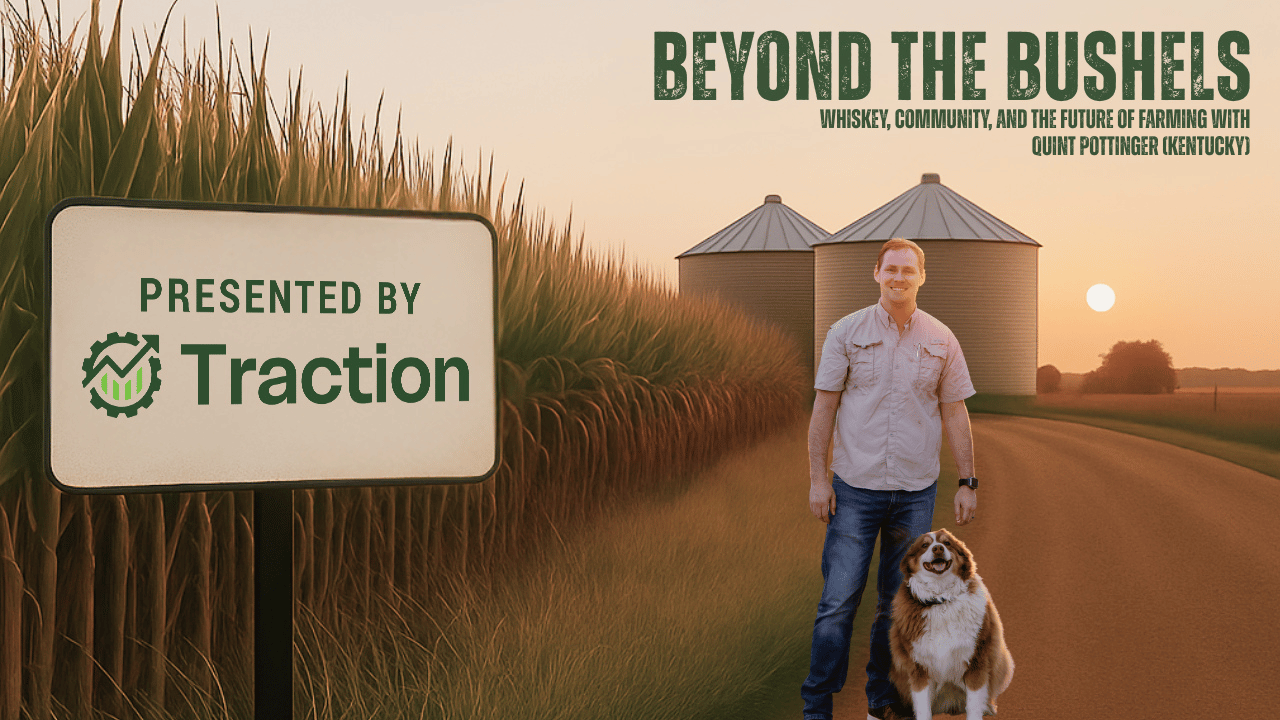Whiskey, Community, and the Future of Farming with Quint Pottinger (Kentucky)
Quint Pottinger farms in the heart of Kentucky bourbon country, where his family’s roots stretch back to Revolutionary War captain Sam Pottinger, and the founding of New Haven. His given name is Butler Ramey Pottinger V, but the nickname “Quint” stuck early on. After earning an ag economics degree from the University of Kentucky in 2011, he and his wife, Leah, bought the last 80 acres from his grandmother and started farming in 2012. That year brought a drought, piles of student debt, and even a side hustle planting 2,000 tomato plants to make ends meet. The first years were humbling, but they set the stage for the unconventional path he’d take.
The breakthrough came from an idea to bag clean corn for deer hunters. Using an old feed bin and a small bagging setup, Quint sold thousands of bags through local hardware stores. One day, a bearded man from a small Bardstown distillery walked in, ripped open a bag, and offered to buy every pallet on hand. That handshake was the start of a new market—grain for Kentucky’s craft whiskey industry. Today, about a fifth of Quint’s corn still goes to deer feed, but the majority heads to distillers like Log Still and Preservation, with the farm also producing wheat and rye tailored to their mash bills.
For Quint, sustainability isn’t just about soil and economics, it’s also about community. He sees farming as a three-legged stool: economic, environmental, and social. Grain sold a quarter mile down the road keeps dollars in the county, and sharing meals with employees at his parents’ table creates bonds stronger than any paycheck. “You’ve got to create that environment,” he says, pointing to the monthly goal-setting sessions he holds with employees as proof that investing in people pays off. His dad, now in his seventies, remains an active partner, early adopter of technology, and mentor in both farming and risk taking.
The farm philosophy mirrors what Quint learned early on: resilience comes from stacking small wins and being prepared when opportunity shows up. Running older, paid-for iron keeps capital in check, while investing in data, cleaning systems, and local partnerships creates staying power. He’s blunt, saying that farming today is first and foremost a business. Ee reconciles books daily, raises outside capital with clear plans, and values his operation like a company rather than a pile of assets. “Hope isn’t a strategy,” he says. “It’s what keeps you going while you execute one.”
What keeps him motivated is seeing agriculture as more than just yields; it’s about creating food systems that serve the community where they’re rooted. Whether it’s clean grain for a distillery, a small meat processing facility in the works, or a vision of keeping more value in rural America, Quint is convinced the next wave of farming is about building shorter, stronger local value chains.
🎙️ Pass the mic
• Previous guest’s question: What are your hopes and dreams about the future of farming and agriculture in general?
• Quint’s question for the next guest: How do you help your employees develop personally and professionally while still growing the business?
You can find Beyond the Bushels podcast episodes here, and wherever you listen to podcasts. We hope you’ll tune in, subscribe, and be an ongoing part of the conversation.
Farm accounting that just works.
Tired of hacking workarounds in software that wasn’t built for farms? We made Traction Ag just for you.

Agape Farms in Ohio



